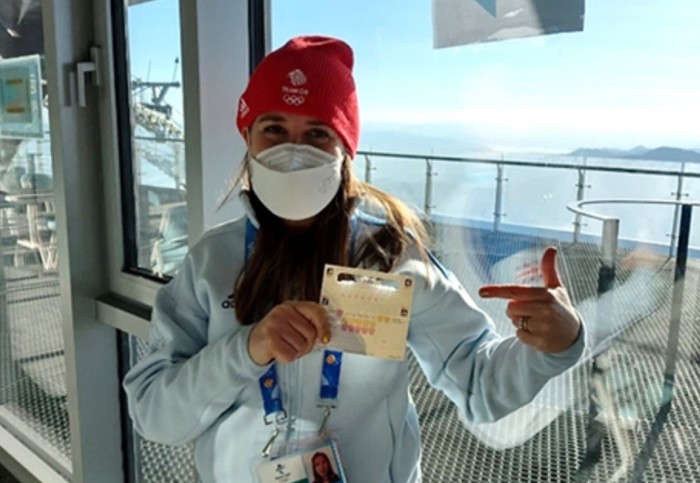
Dragonfly in action in Beijing

Rapid testing for respiratory viruses at the Winter Olympics helped British athletes keep their eyes on the prize.
When Team GB set out for the Winter Olympics in Beijing last February, it packed a test for respiratory diseases developed by Imperial startup company ProtonDx. Before the games even opened, the diagnostic technology put in a winning performance, ensuring that Britain’s athletes could compete as planned and stay focused on their goals.
Respiratory health was a major concern at the Winter Olympics, due to the ongoing COVID-19 pandemic. Athletes were tested regularly, with a positive result putting an end to all hope of taking part in the competition, both for the individual and any teammates in close contact. Waiting for results and worry about false positives put added psychological pressure on athletes preparing to compete for their sports’ highest honours.
This is where the Dragonfly Respiratory Diagnostic Panel, developed by ProtonDx at Imperial’s White City Incubator, was able to give additional reassurance. Underpinning the panel is an innovative sample collection and analysis technique, conceived in the labs of Dr Jesus Rodriguez Manzano, from the Department of Infectious Disease, and Professor Pantelis Georgiou, from the Department of Electrical and Electronic Engineering, that provides a very pure and amplified DNA/RNA sample without the need for laboratory processing. Dragonfly makes use of this technique to deliver a colour-change test for the identification of multiple respiratory illnesses.
“Dragonfly allowed us to bring the lab to our athletes.” Greg Retter Team GB COVID Liaison Officer
It can detect the low viral loads present during the early stages of a respiratory infection, and distinguish rapidly between virus types, indicating whether it has found influenza A, influenza B, respiratory syncytial virus (RSV), rhinovirus or the SARS-CoV-2 virus responsible for COVID-19. The test is complete in half an hour, providing results as reliable as a PCR test.
The only hardware required is a small, portable heating block, which means the test is highly mobile. That was important for the Winter Olympics, which were held at three separate locations in and around Beijing. “With sample to result in less than 30 minutes and the ability to simultaneously run multiple tests, Dragonfly allowed us to bring the lab to our athletes,” says Greg Retter, Head of Performance Services and Team GB’s COVID Liaison Officer in Beijing.
Flagging a false positive
The first test for the system came as soon as Team GB landed. “Upon arrival to Beijing, two of our athletes received an unexpected positive COVID test performed by the Chinese authorities,” Mr Retter recalls. “While we believed that neither had COVID, as all delegates had undergone rigorous additional PCR testing prior to departure, both athletes were tested with Dragonfly and within 30 minutes assured that they were indeed negative. The negative Dragonfly test provided valuable and timely reassurance, allowing a good night’s rest. On the following day, subsequent Chinese testing confirmed the athletes were indeed negative.”

Team GB talked with the ProtonDx team on numerous occasions during the games, providing insights into the high-stakes implementation of remote viral testing for elite athletes. “Our entire company was energised to see the photos sent from Team GB in which Dragonfly was used at the top of the downhill ski venue and at -20 degrees C,” says company Chairman Bob Enck.
“This technology can provide ultra-rapid, extremely precise, molecular testing for everyone at the point-of-need.” Dr Jesus Rodriguez-Manzano Chief Scientific Officer, ProtonDx
Dragonfly’s application extends well beyond elite sports. It can be used in any setting where accurately and quickly identifying the cause of a respiratory infection is beneficial. In nursing homes or elderly care facilities, for example, immediately detecting an influenza or COVID-19 outbreak means that appropriate action to be taken to protect residents. The same goes for warehouses or distribution centres, where regulations require different procedures in the event of an RSV or COVID-19 outbreak.
“Our vision is to use this technology to provide ultra-rapid, extremely precise, molecular testing for everyone at the point-of-need, without the requirement of a laboratory,” says Dr Jesus Rodriguez-Manzano, Chief Scientific Officer at ProtonDx and lecturer in the Department of Infectious Disease at Imperial.
ProtonDx was founded in 2020 to commercialise multi-disciplinary research carried out in Professor Georgiou’s lab in the Department of Electrical and Electronic Engineering as well as Dr Jesus Rodriguez Manzano’s research in the Department of Infectious Disease. Its core technology builds on several years of research in diagnostics, and collaboration between engineering, medicine and molecular biology. The startup moved into the Imperial Incubator at White City in March 2021, building on past support from the College’s enterprise ecosystem, including the Techcelerate and MedTech SuperConnector (MTSC) programmes, the Imperial Venture Mentoring Service, and the Friends of Imperial College.
Article text (excluding photos or graphics) © Imperial College London.
Photos and graphics subject to third party copyright used with permission or © Imperial College London.
Reporter
Ian Mundell
Enterprise


